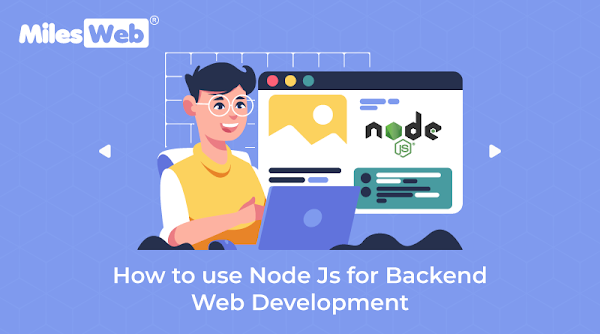How to use Node.Js for Backend Web Development?
Node.js is accessible on Google Chrome's V8 engine. It is written in JavaScript and runs on the Node.js runtime on OS X, Microsoft Windows, and Linux. Two of the mentioned operating systems, Linux and Windows OS, comprise the Node.js server hosting plans of MilesWeb. Use their web hosting infrastructure to build a robust web application hassle-free.
Many renowned companies like Netflix, Uber, and others use Node.js platforms. But many developers have concerns about whether it can be used mostly for backend or frontend purposes. Because of its versatile features, Node.js is the best choice for backend applications. Its application is easy to deploy on Kubernetes clusters. However Jenkins is also one one automated software platform for building, testing, and deploying apps. Thus, there will be a continuous debate between kubernetes vs jenkins to build Node.js apps. Let's discuss briefly whether Node.js is beneficial for Backend web development in this article.
What Is the Purpose of Node.js?
The main objective behind using Node.js is to get efficient results. The client-server and the data processing interaction, development, and progression are all carried out effectively. Therefore, there is an event-driven two-way connection between clients and the server. Due to this, both parties will begin communication and data exchange. Node.js is an excellent and robust framework in scaling circumstances because of its unique I/O approach.
Besides, it is lightweight and can employ JavaScript code on both the front and backend. It opens up new development and new opportunities. Due to the flexibility of the frontend and backend, the developer community will be significantly more efficient and cross-functional.
Is Node.js Used for Frontend or Backend?
Many developers misunderstand that Node.js is exclusively used only as a backend framework to build servers. However, this is different and can be used as the front and backend. It is an event-driven framework and is popular because of its scalability and flexibility.
So, beginners who thought only backend or frontend activities were possible on Node.js have their answer.
Pros of Using Node.js for Backend Development
One survey found that Node.Js' average usage consistency spanned over two years, making it a preferred option over its competitors.
Getting a Higher Performance for Real-time Applications
Node. Js-based web apps are quite capable of multitasking. Unlike other platforms, its single-threaded, event-driven architecture efficiently processes multiple concurrent requests without clogging RAM. As a result of its event-loop and non-blocking I/O (Input Output) operations, code can be executed at a speed that substantially impacts the overall performance of the application.
Offers Easy Scalability for Modern Applications
In cutting-edge technology, cluster module is one of the major characteristics. CPU cores load balancing feature in Node.js makes it possible to achieve desired results with smaller modules and exhausting RAM. Moreover, it uses a non-blocking event-loop system giving excellent scalability and allowing the server to respond to requests quickly.
Offers Community Support to Simplify Development
We can expect substantial assistance from development specialists worldwide to resolve even the most unusual development challenges due to millions of active developers in the Node.js community.
The most popular JavaScript package manager is NPM, a JavaScript package manager registry. Your project can benefit from a variety of tools and libraries included with it. Additionally, you’ll find a wide collection of resources - ready-to-use solutions, codes, modules, libraries, and registries - created by developers to help us accomplish more.
Helps in Building Cross-Functional Teams
You can build a team to improve your development life cycle and respond to problems quickly using Node.Js' full-stack capabilities. You can solve and fix problems more effectively in this work environment, and it is also possible to reduce the time-to-market.
Improves App Response Time and Boosts Performance
Node.js offers a non-blocking asynchronous architecture that uses fewer resources and produces fewer threads thanks to its single-threaded event-loop paradigm. The ability to handle multiple concurrent users improves your program's responsiveness.
Understanding the popularity of Node.js
The Node.js environment is a rapidly evolving and promising environment positioned to solve and reduce many of our app development challenges. Many programmers in the coming year will use this framework to build their applications. Also, they have seen many positive outcomes by doing so. Developers use this framework to expand their horizons and become full-stack experts. Many tutorials and guides are available to make the development task easier.
Conclusion
So far, you might have understood why Node.js is beneficial for backend web development. It is time to choose the right web hosting partner and host your websites and applications. MilesWeb gives you the right web hosting infrastructure with excellent features. Great security, excellent storage and top-grade servers will make Node.js applications' hosting with no concerns.












Comments